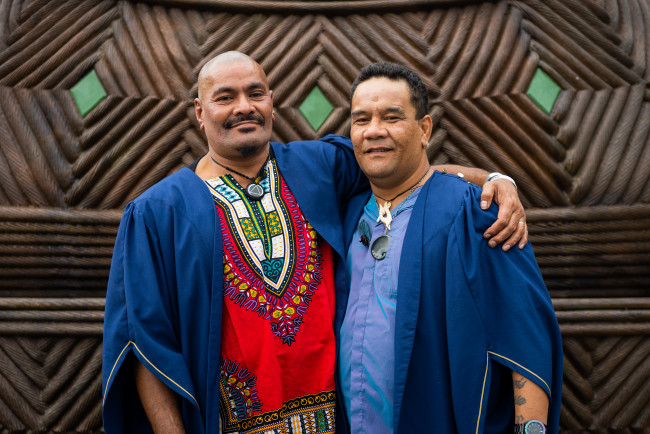“Bromance” paves way to graduation

It was daunting to go back to school. But I have something to offer.
When Reece Clarke and Walter Wakefield walked across the Dunedin Town Hall stage to graduate with their New Zealand Certificates in Health and Wellbeing (Social and Community Services) (Level 4), it encompassed so much more than their academic achievements.
That journey from seat to stage and back again has been far longer.
For Walter, that meant returning to a formal education setting for the first time in four decades.
Having left school at 10 and become a homeless teenager living on the streets of Wellington, Walter navigated a “real colourful background”, before eventually settling in Dunedin. He had been working in the construction industry until a severe back injury put paid to that career last year.
On the advice of a counsellor at Moana House, where he underwent addiction rehabilitation, he enrolled at Otago Polytechnic - a decision he admits was a daunting one.
I didn’t want to feel like I did back when I was 10 – looked down upon. I admit I had to get out of a few holes this year.
And who was there to help him out? Among others, his classmate, Reece.
For Reece, too, knows about holes. A recovering alcoholic, he didn’t know Walter when he enrolled at Otago Polytechnic, yet he suspected they might have more than a few things in common.
“Walter and I both come from similar rough backgrounds, so people didn‘t know what to think of us when we first turned up," he recalls.
I asked Walter if he’d be keen to work out in the morning. That soon turned into a daily ritual: we’d go the gym, go and have a coffee, have a chat with the girls at the front desk at Otago Polytechnic, then go to class.
The pair soon established a study group that included three women. Others came and went but the core quintet remained strong. In fact, they all remain firm friends.
By the middle of the year, Reece and Walter were being referred to as the “aunties” of the class.
“That’s because of the way we worked with the others. We just like to help,” Reece says.
We are both in recovery so we have had to unpack a whole lot of … over the years. We added a bit of colour and character to the class.
Walter (Ngāti Porou) believes his life experiences are less a burden, more a bundle of insights he can share with others.
“I just want to give back. I have something to offer,” he says.
As for Reece, he has a job lined up with The Salvation Army Bridge Treatment Programme.
“If I hadn’t met Walter this year, I don’t know if I would have finished this,” he says.
Walter agrees: “That goes both ways.”
They then share yet another laugh.
“Yeah, we are in a bromance.”
